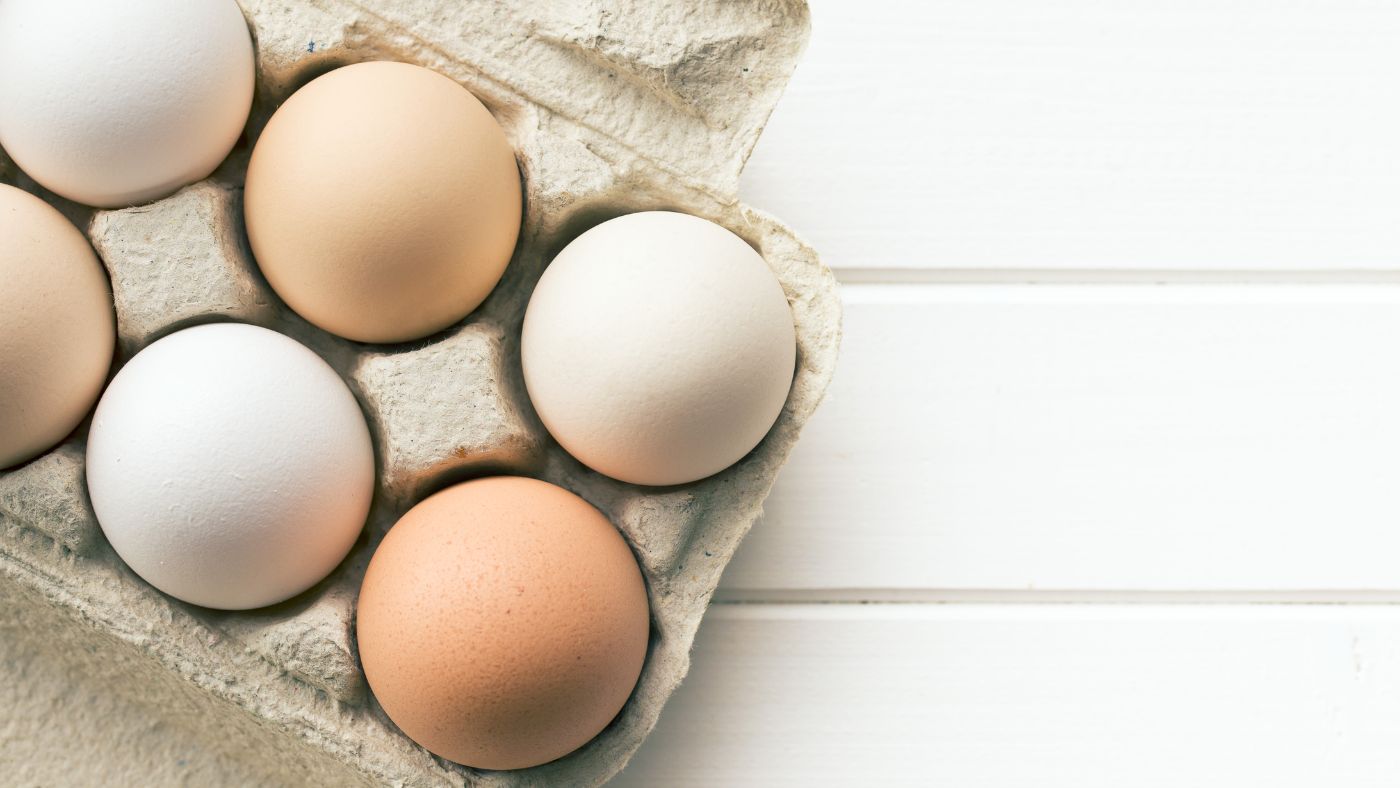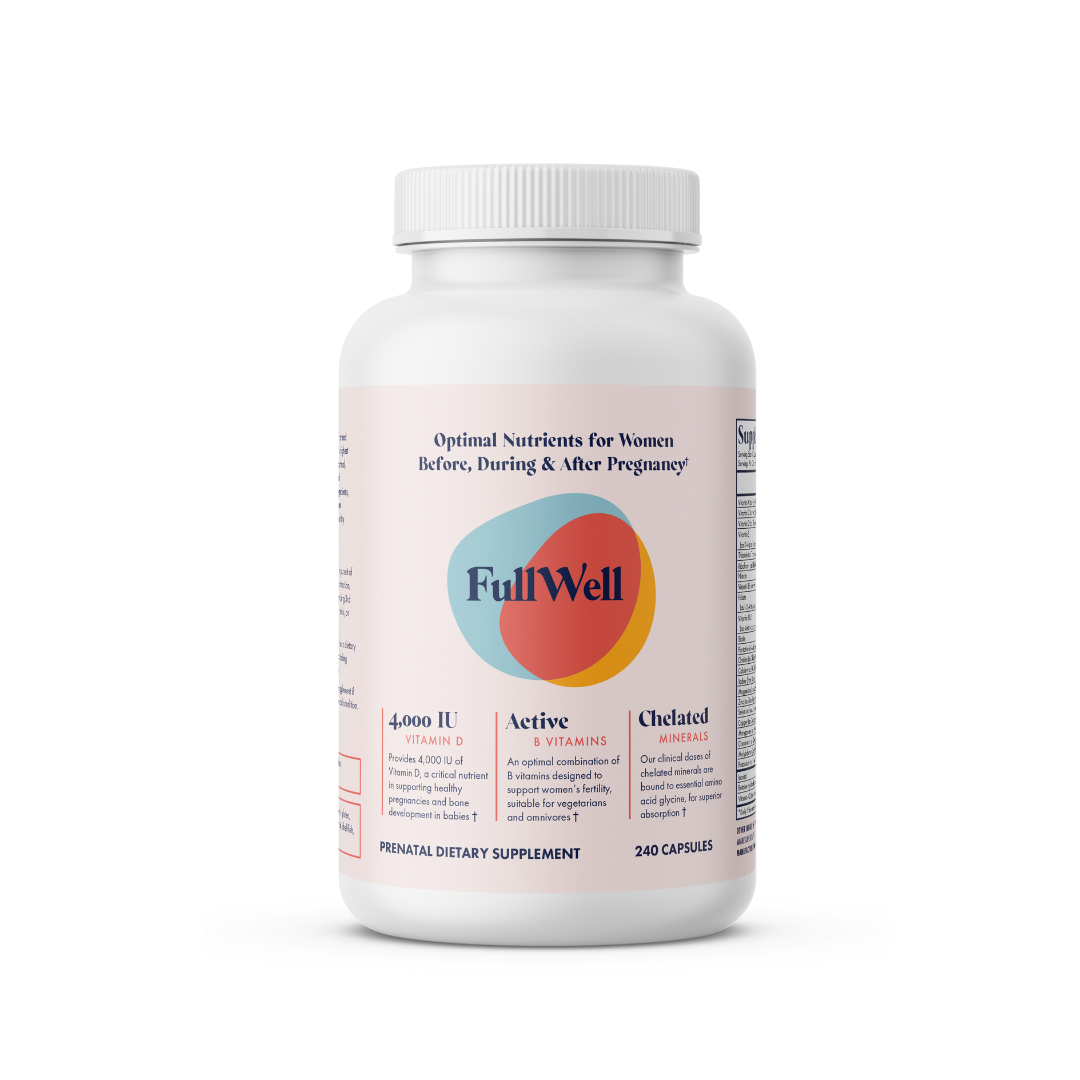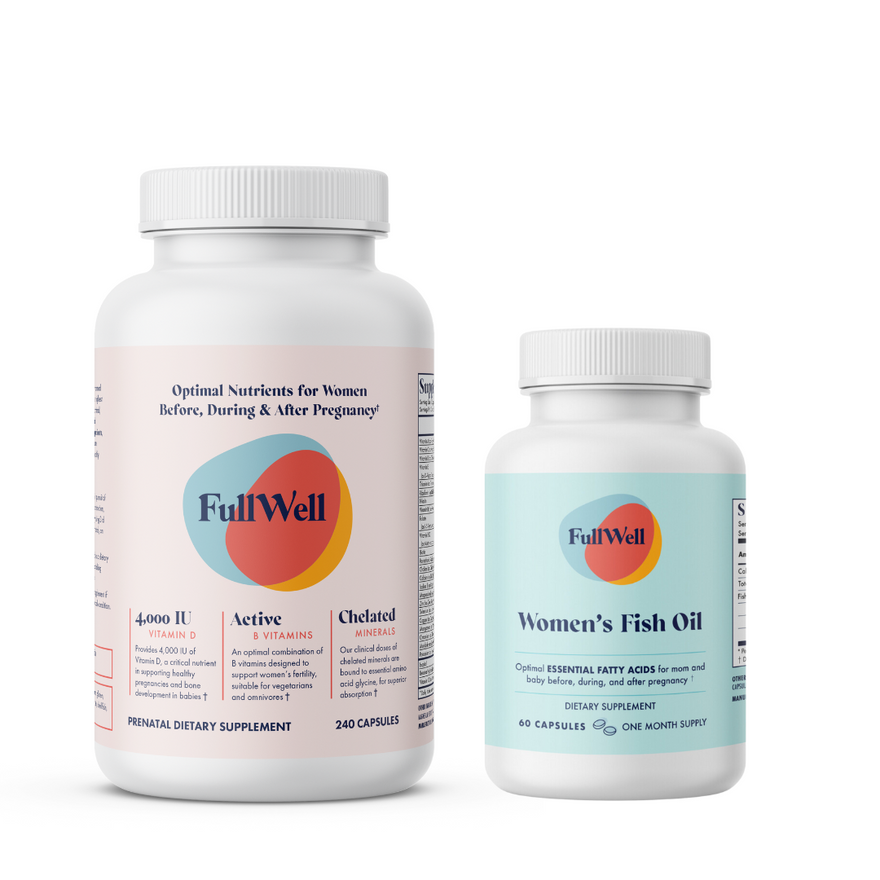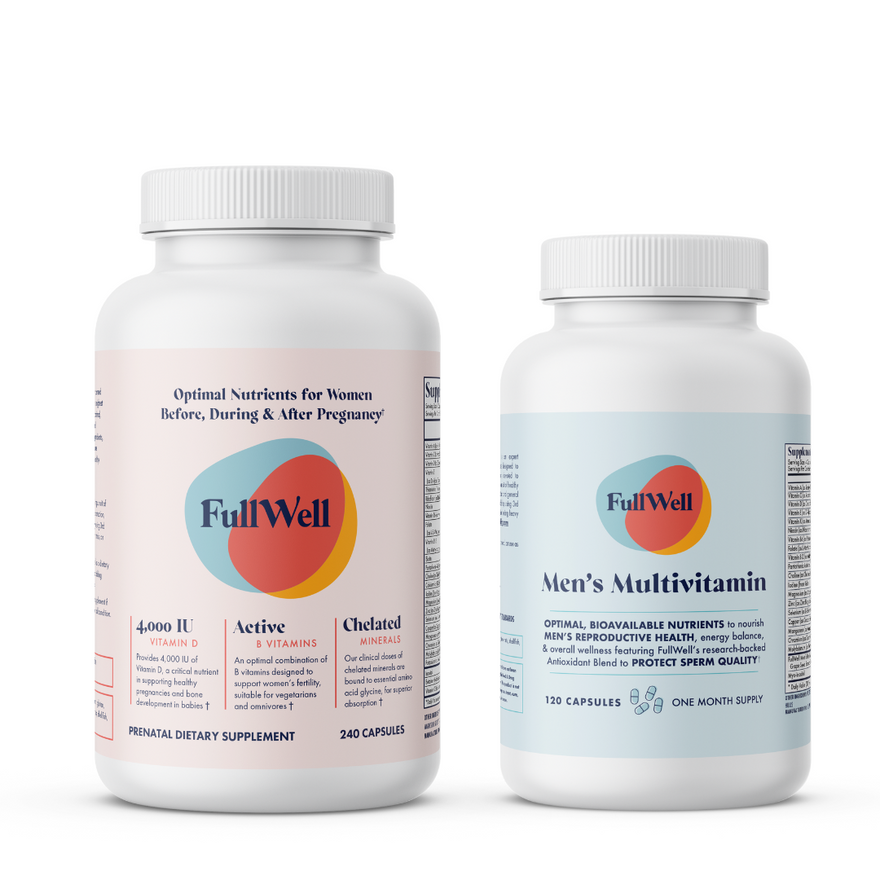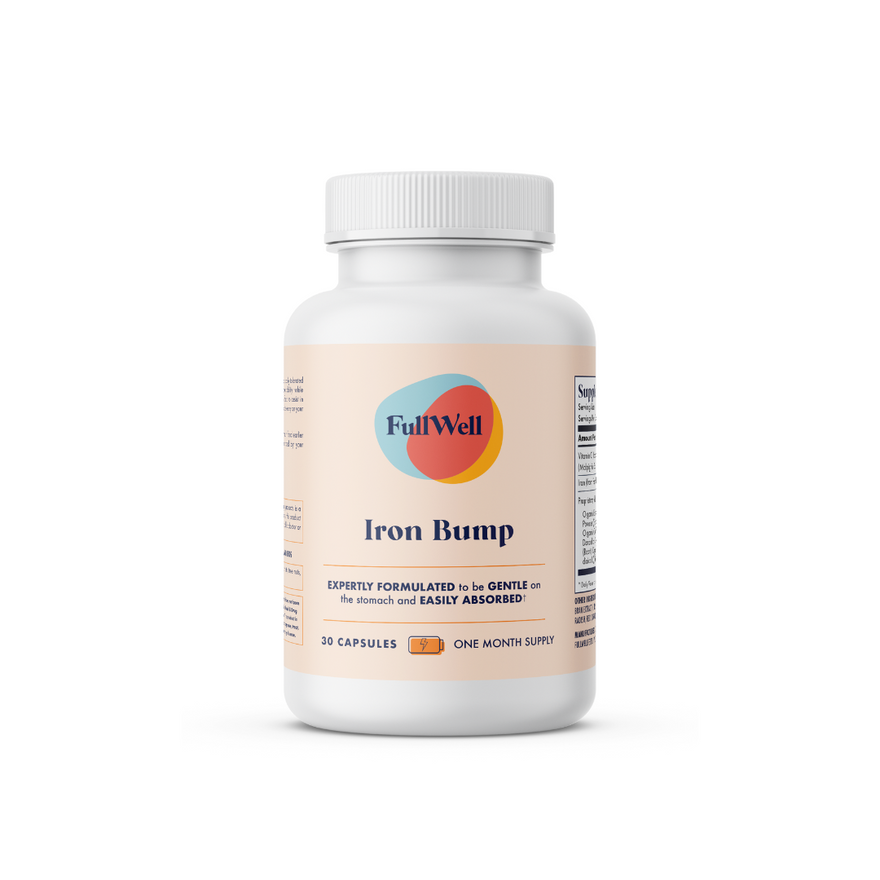Women's Prenatal Multivitamin
Women's Prenatal Multivitamin
Your vitamin & mineral needs are fully covered with our expert-formulated prenatal vitamin & mineral complex.
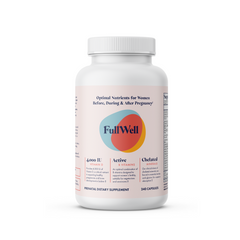
Women's Prenatal Multivitamin
Original Prenatal
Original
Transit times reflect continental US shipping. Canadian shipping ranges from 3-9 business days. Carrier delays due to seasonal peaks or weather conditions may occur.
Highlights / Why You’ll Love It:
- RD-formulated, MD & OBGYN recommended
- Evidence-based doses and crucial nutrients in bioavailable forms
- Third-party tested for potency, allergens, and contaminants on every lot
- Non-GMO + Allergen friendly
- FSA / HSA eligible
Details
Details
FullWell women's prenatal delivers optimal, evidence-based forms and doses of nutrients in one potent yet easy-to-tolerate formula. You'll find fertility non-negotiables like folate, B12, and chelated minerals in active, bioavailable forms, plus essential pregnancy nutrients that other prenatals skimp on like choline, calcium, and magnesium.
Iron-free formula: There is no one-size-fits-all when it comes to iron needs, with some women not needing iron supplementation at all to others needing doses higher than what many prenatal supplements provide. Our Prenatal is iron-free to provide maximum customizability while also increasing tolerance. Shop our easy-to-tolerate Iron Bump for your individualized needs.
DHA-free formula: While DHA has been extensively studied for its role in supporting brain and visual development during pregnancy and lactation, recent research indicates that EPA is crucial for facilitating DHA's transfer across the placenta, allowing the baby to effectively utilize it. These two essential omega-3 fatty acids are not stable when mixed into a multivitamin and it best to take separately. Shop our Prenatal + Fish Oil Bundle here.
Free of the following allergens: gluten, wheat, dairy, peanuts, tree nuts, shellfish, eggs, sesame, and soy
Testing
Testing
FullWell exceeds current standards by using third-party, independent testing for harmful contaminants - including heavy metals - on every single lot we produce. To see testing results for the most recent lot, please visit our Knowledge Well or feel free to reach out to us directly at cs@fullwellfertility.com.
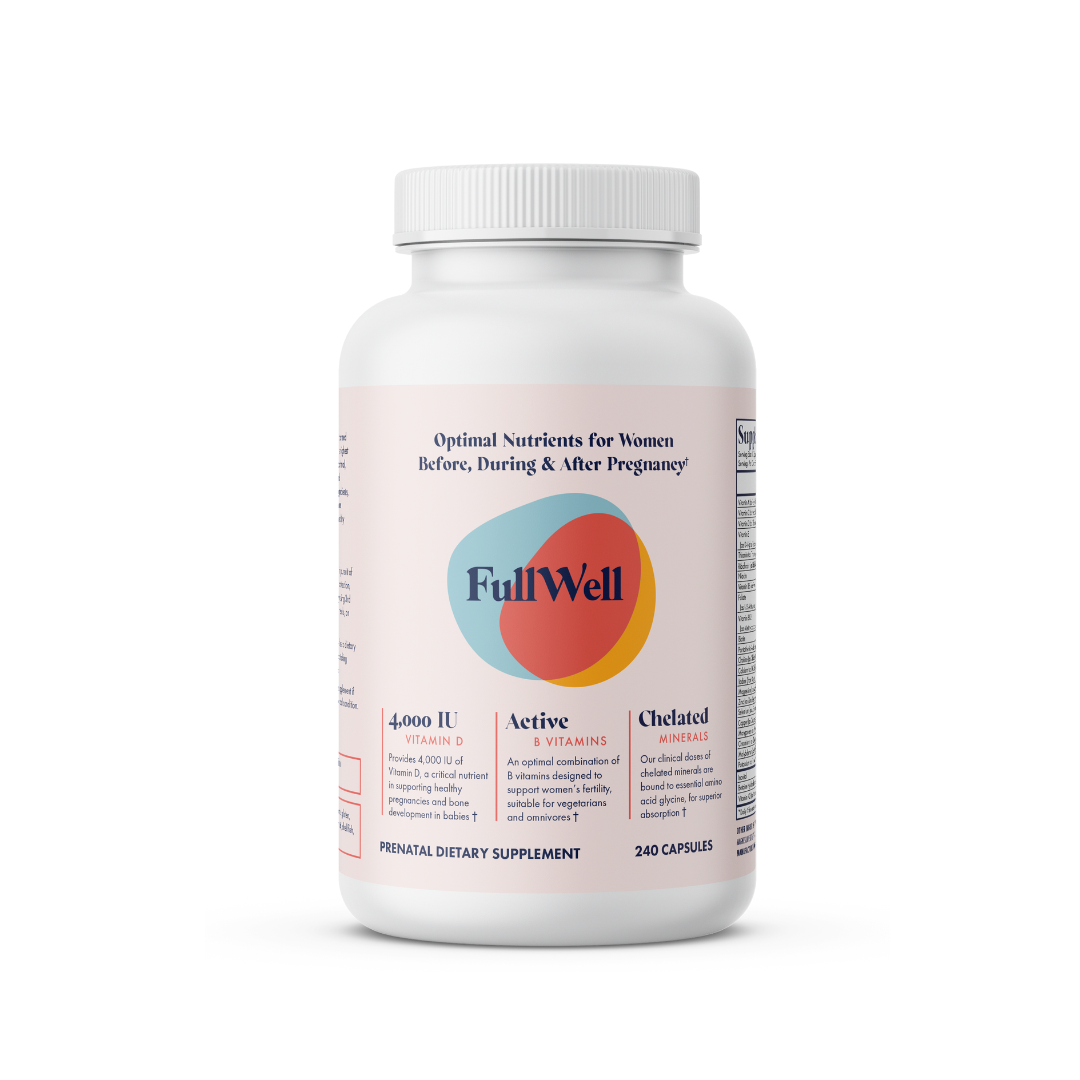






Taking Your Prenatal

ALL AT ONCE
If you can tolerate 8 at once, go for it! Just make sure you drink plenty of water.
DIVIDE YOUR DOSE
4 at breakfast + 4 at lunch
MIX IT UP
Break open your capsules and mix them into your favorite cool beverage
Ingredients at a glance
Folate
- Supports normal neural tube formation*
- Supports baby’s heart, growth, and more*
Learn more
Learn more
The form of this nutrient matters: Regardless of your genetics, it is actually natural folate (not the more commonly used folic acid) that is the most bioavailable form and thus, a critical component in prenatal vitamins.
Find it in
- Spinach
- Liver
- Sunflower seeds
Choline
- Supports normal neural tube formation*
- Aids placental function*
- Assists brain development*
Learn more
Learn more
90-95% of pregnant moms don’t consume enough choline.* While the body can synthesize choline, the amount we eat is not sufficient to meet our needs.
Find it in
- Liver
- Red meat
- Egg yolk
Vitamin D
- Supports growth and skeletal development*
- Promotes healthy blood pressure levels*
- Fortifies baby’s immune system*
Learn more
Learn more
Vitamin D deficiency is common across all geographic locations, races, sexes, and genders.* The 4,000 IUs in our women’s prenatal is both safe and important for mom and baby.
Find it in
- Beef liver
- Mushrooms
- Salmon, tuna, sardines
Vitamin K2
- Works synergistically with vitamin D & calcium*
- Supports baby’s skeletal development*
- Maintains mom’s dental health*
Learn more
Learn more
When taken alongside Vitamain D, Vitamin K2 promotes optimal vitamin D bioavailability and calcium balance*
Find it in
- Natto
- Gouda Cheese
- Salami
Magnesium
- Supports sleep*
- Supports mood*
- May help ease nausea*
Learn more
Learn more
Most prenatal multivitamins contain little or no magnesium, despite its importance, because it is a “bulky nutrient” that drives up the number of capsules per serving. For us, it’s non-negotiable.
Find it in
- Pumpkin Seeds
- Avocado
- Dark chocolate
Calcium
- Supports the normal formation baby’s nervous & circulatory systems*
- Supports musculoskeletal system development*
Learn more
Learn more
Some women can meet the required intake through diet, but since calcium is so critical, we include more calcium than most prenatal supplements.*
Find it in
- Sardines or salmon w/ bones
- Tahini
- Dairy
Iodine
- Required for normal thyroid function*
- Protects endocrine health*
- Supports breastmilk production*
Learn more
Learn more
The World Health Organization recommends 250 mcg of supplemental iodine in pregnancy since pregnant and breastfeeding moms need even more iodine than normal.*
Find it in
- Seaweed
- Shellfish
- Beef liver
Vitamin B12
- Promotes healthy, full-term pregnancy*
- Supports neural tube formation*
- Supports baby’s long-term motor development*
Learn more
Learn more
Research shows that B12 intake in pregnancy should be triple the current RDA, especially since only a fraction of what we consume is absorbed by the body.*
Find it in
- Beef
- Full-fat dairy
- Clams
Biotin
- Supports metabolism of fatty acids, glucose, and amino acids*
- Helps with gene regulation and cell signaling*
Learn more
Learn more
One-third of pregnant moms develop biotin deficiency even with adequate dietary intake.* No upper limit exists because there is no evidence that biotin is toxic at high intakes.
Find it in
- Egg yolks
- Organ meats
- Nuts & legumes
Chromium
- Helps maintain normal glucose levels*
- Supports carbohydrate, lipid, and protein metabolism*
Learn more
Learn more
Chromium works with insulin to help maintain a normal level of glucose in your body and is especially important during pregnancy.
Find it in
- Broccoli
- Potatoes
- Seafood
Copper
- Helps form baby’s heart, red blood cells, and blood vessels*
- Supports formation of skeletal and nervous systems*
Learn more
Learn more
Copper is involved in energy production and synthesis of iron metabolism connective tissues, helping to maintain healthy iron levels during pregnancy and beyond.*
Find it in
- Organ meats
- Seafood
- Nuts & seeds
Magnesium Stearate
- Improves consistency of capsule quality
- Delays breakdown and absorption of capsules
Learn more
Learn more
Magnesium stearate is a simple salt that combines the mineral magnesium with stearic acid, a common saturated fat found widely in foods. Supplements that do not use it see shocking margins of error in consistency and quality.
Find it in
- Dark chocolate
- Coco butter
- Olive oil
Manganese
- Helps develop baby’s bones and cartilage*
- Metabolizes carbohydrates, amino acids, and cholesterol*
- Supports healthy blood pressure levels*
Learn more
Learn more
Manganese is an essential mineral, meaning we cannot make enough in the body to meet demands, and it must be supplemented through diet.*
Find it in
- Whole grains
- Shellfish
- Black pepper
Molybdenum
- Vital for healthy liver detoxification*
- Enzymatic cofactor involved in many types of metabolism within the body*
Learn more
Learn more
We do not need a lot of molybdenum, but what we do need is critical.* Our 100 mcg is higher than the RDA, but far lower than the tolerable upper intake level of 2,000 mcg.
Find it in
- Rice
- Beef
- Bananas
Niacin
- Essential for baby’s brain development*
- Nurtures the nervous system*
- Supports healthy mucous membranes*
Learn more
Learn more
Niacin promotes healthy skin while improving mom’s digestion and easing nausea.*
Find it in
- Red meat
- Poultry
- Brown rice
Pantothenic Acid
- Aids hormone and cholesterol production*
- Necessary for chemical reactions within cells*
- Helps metabolize carbohydrates, fats, and proteins*
Learn more
Learn more
Pantothenic Acid is needed for hormone synthesis and becomes critical during pregnancy when hormone production kicks into overdrive.
Find it in
- Milk
- Avocado
- Mushroom
Potassium
- Helps maintain balance of fluids and electrolytes*
- Helps regulate muscle contractions and nerve signals*
Learn more
Learn more
Potassium is important in ALL tissues in the body.
Find it in
- Oranges
- Beans & lentils
- Avocado
Riboflavin
- Promotes good vision and healthy skin*
- Supports growth of baby’s bones, muscles, and nerves*
- Supports healthy blood pressure*
Learn more
Learn more
This water-soluble nutrient contains ‘flavins’ that are responsible for the (safe and normal) neon yellow color seen in the urine once it’s been absorbed.
Find it in
- Beef
- Pork
- Cheese
Selenium
- A powerful antioxidant that fights oxidative stress*
- Plays a key role in thyroid hormone synthesis and function*
Learn more
Learn more
Selenium is important to preconception and early pregnancy for both moms and dads because it positively impacts both sperm and egg quality.*
Find it in
- Turkey
- Eggs
- Brazil nuts
Thiamin
- Helps convert carbohydrates to energy*
- Supports nervous system*
- Needed for normal muscle function*
Learn more
Learn more
Though thiamin deficiency is rare, excessive vomiting in pregnancy can cause thiamin depletion. No adverse responses are associated with intakes over 50 mg, so it is wise to supplement this nutrient.
Find it in
- Green peas
- Sunflower seeds
- Full-fat yogurt
Vitamin A
- Develops healthy eyes and vision*
- Supports immune responses in baby and mom*
- Stimulates healthy thyroid function*
Learn more
Learn more
Vitamin A helps direct which cells become which organs, putting together body systems as baby develops.
Find it in
- Beef
- Cheese
- Carrots
Vitamin B6
- Supports mood*
- Enhances sleep*
- Reduces nausea*
Learn more
Learn more
Vitamin B6 comes to the rescue when facing the most challenging pregnancy symptoms while also helping to prevent more serious complications.*
Find it in
- Salmon
- Papaya
- Chickpeas
Vitamin C
- Antioxidant that protects against free radicals*
- Plays a huge role in immunity and inflammation*
Learn more
Learn more
Vitamin C improves hormone levels and promotes a healthy reproductive system in both men and women.*
Find it in
- Kiwi
- Citrus
- Strawberries
- Cabbage
Vitamin E
- Powerful antioxidant*
- Supports lung development and immune function in baby*
- Increases circulation and mitochondrial health in mom*
Learn more
Learn more
Healthier mitochondria = healthier eggs! Vitamin E can help lead to easier conception with potentially fewer pregnancy complications.*
Find it in
- Peanut butter
- Beet greens
- Pumpkin
Zinc
- Key to healthy immune function*
- Supports healthy, full-term birth*
- Keeps hormones regulated*
Learn more
Learn more
Zinc is a vital nutrient to get through both diet and multivitamins. For vegetarians, it is especially critical to supplement since animal products are some of the most zinc-rich foods available.*
Find it in
- Berries
- Nuts
- Red meat
Myoinositol
- Makes insulin more effective*
- Supports egg quality*
Learn more
Learn more
This vitamin-like substance has a wide range of health benefits, supporting the overall mood and well-being of expectant moms.*
Find it in
- Cantaloupe
- Oats
- Citrus
Betaine HCl
- Supports digestion*
- More efficient absorption of other critical nutrients
- Builds tolerance
Learn more
Learn more
Many women report feeling less nauseous and better overall tolerance while taking our women’s prenatal over other brands!
Find it in
- Spinach
- Beets
- Meat & poultry
Women's Prenatal FAQs
Why is the serving size 8 capsules?!
Why is the serving size 8 capsules?!
Why doesn't your prenatal contain iron?
Why doesn't your prenatal contain iron?
Customer reviews
I haven’t been taking for long yet but I’m impressed how easy to tolerate these are considering the high dose of nutrients you get and the fact that it’s 8 pills a day. That might be tough to swallow for some people specially in the first trimester but these are as easy to tolerate as any vitamin I’ve ever taken and I’m amazed how little odor the capsules have (original). They barely smell like vitamins and I like that they are smaller capsules not huge pills and they contain enough magnesium and vitamin D that I don’t need to take those other pills!
I’m an older mom and these supplements really helped me.
Best pre-natal vitamins ever!
My husband and I just starting our family planning journey, as someone in my early 30's I put a lot of research into what prenatal was going to give me the absolute best support. I am 2.5 weeks into my first bottle of FullWell, and I am very impressed! Personally, the 8 servings doesn't phase me, the initial taste isn't great but I don't find there is a lingering aftertaste (i.e. I am not burping it up, lol). The product is easy on my stomach, and I am overall very happy with all the ingredients and potencies they have packed in! I have already placed my order for my September supply.
Great vitamins, serving size is 8 pills

Related articles
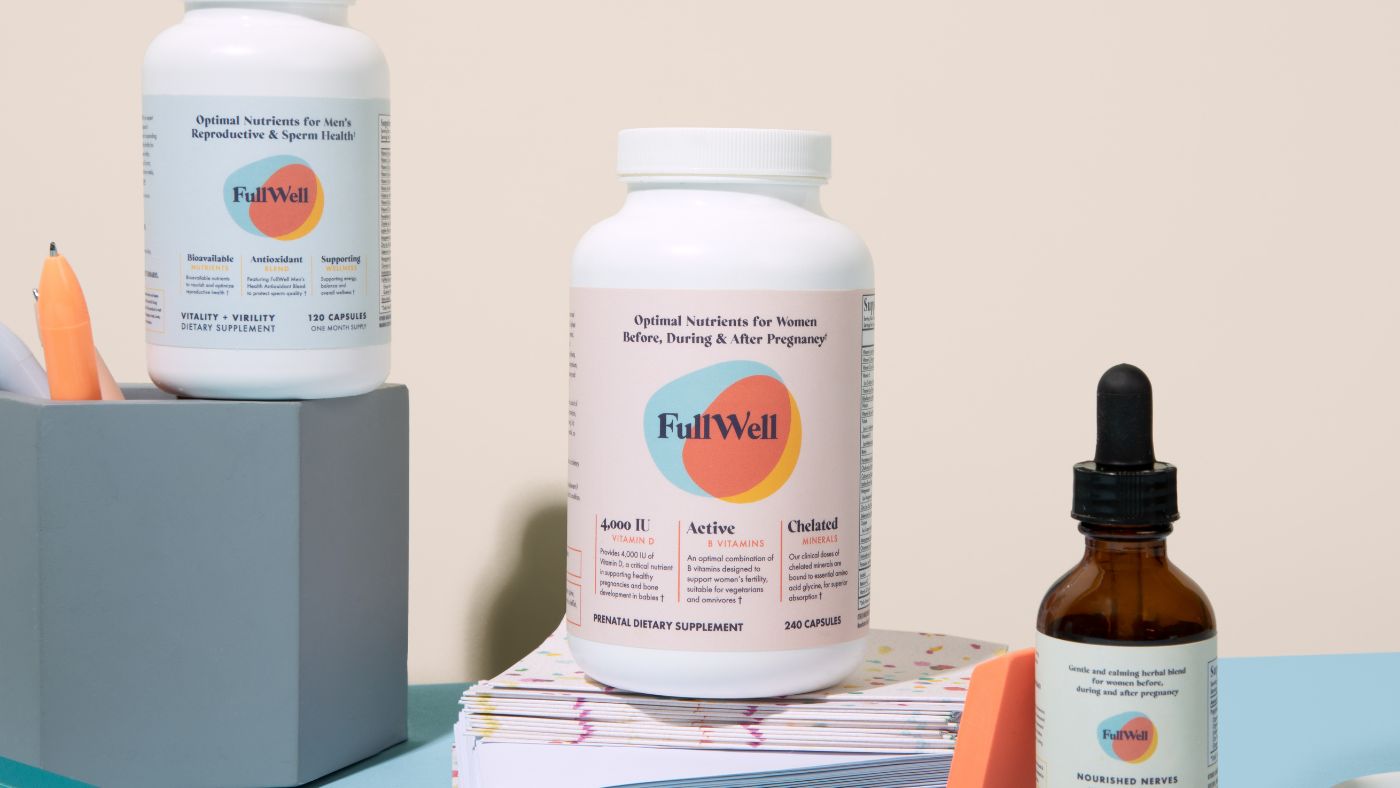
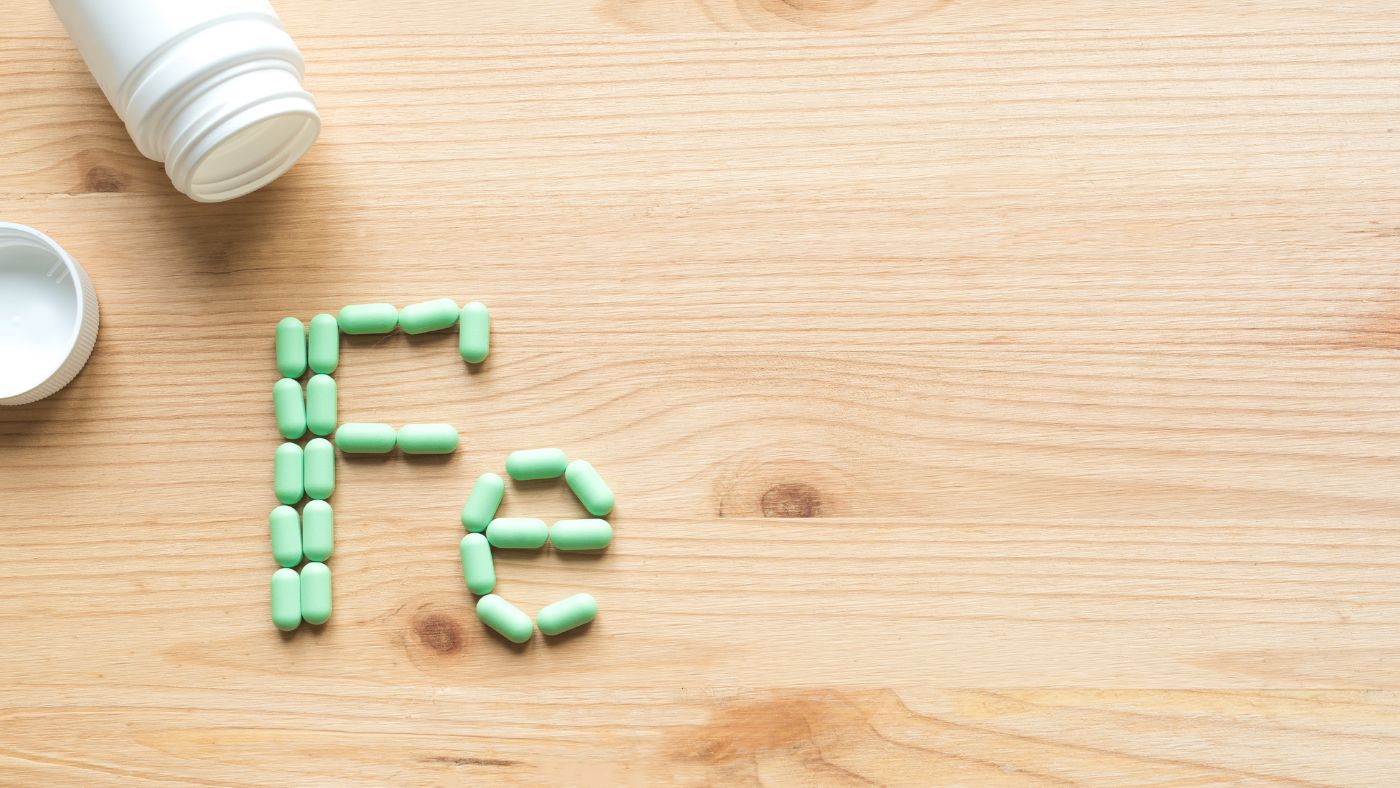
How Much Iron Do You Need During Pregnancy? + 8 Facts About Getting Enough Iron Pregnant Women Need to Know
